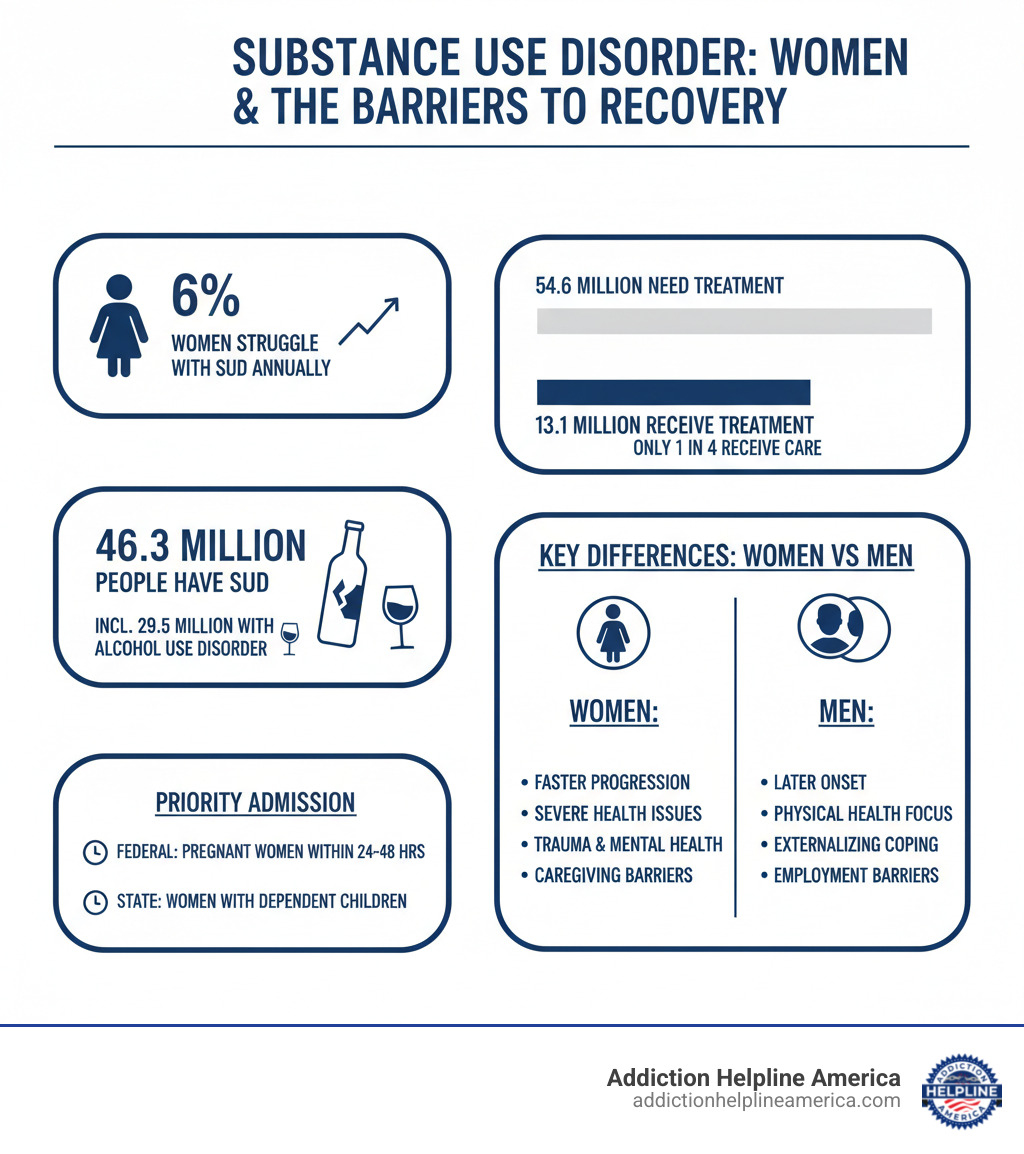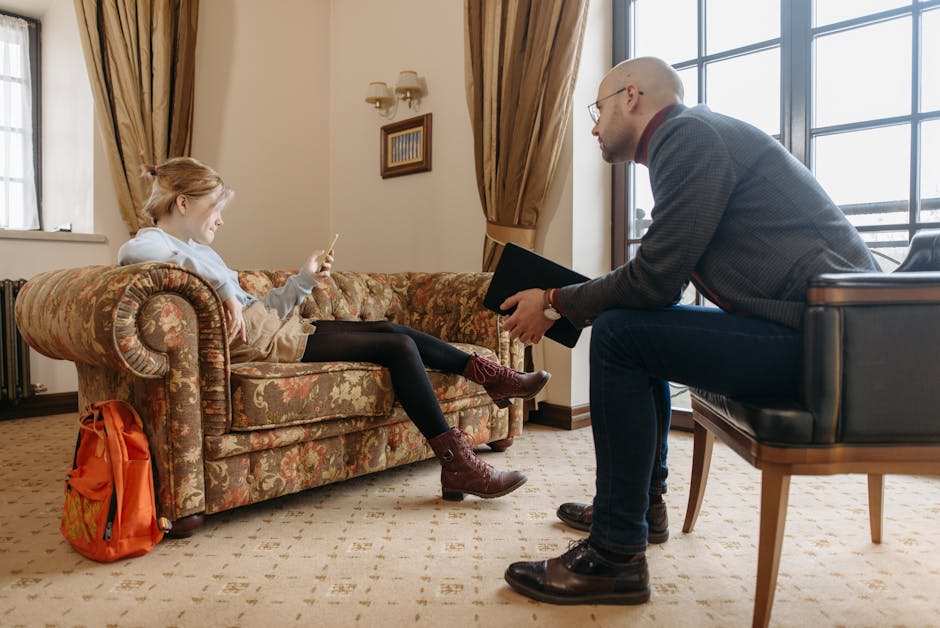
Understanding Women’s Rehab Centers: Your First Step Toward Recovery
Women’s rehab centers are specialized facilities addressing the unique needs of women with substance use disorders and co-occurring mental health challenges. These centers offer gender-specific care in a safe environment, focusing on issues like trauma, pregnancy, motherhood, and mental health conditions that disproportionately affect women.
Key Features of Women’s Rehab Centers:
- Gender-Responsive Treatment – Therapy and programs custom to women’s biological, psychological, and social needs
- Trauma-Informed Care – Specialized support for survivors of abuse, violence, and trauma
- Family-Centered Services – Programs for pregnant women, mothers, and those with dependent children
- Co-Occurring Disorder Treatment – Integrated care for substance use alongside depression, anxiety, PTSD, and eating disorders
- Priority Admission – Federal mandates require priority assessment and admission for pregnant women and women using IV drugs
- Holistic Approach – Treatment addressing mind, body, and spirit through various therapeutic modalities
The statistics are sobering: more than 6% of women struggle with substance abuse, alcoholism, or addiction each year. Yet women face unique barriers to treatment—from caregiving responsibilities to economic challenges and intense stigma. Research shows that women often experience a faster progression to addiction and more severe health consequences compared to men.
At Addiction Helpline America, we understand these challenges and connect women with specialized rehab centers that provide compassionate, evidence-based care. We’ve helped thousands of women find healing through our nationwide network and 24/7 confidential support.
Glossary for Women’s rehab centers:
- How to find the right rehab center
- LGBTQ+ rehab programs
- How to find rehab programs that accept insurance
Why Gender-Specific Treatment Matters: Unique Challenges Women Face
Women’s experiences with addiction are fundamentally different from men’s, involving a complex web of social expectations, trauma, caregiving demands, and unique health challenges. These factors influence how addiction develops and how recovery unfolds.
Many women face crushing shame due to social and cultural pressures to be perfect mothers, caregivers, and professionals. This stigma creates a powerful barrier, keeping women from seeking help for fear of judgment or losing their children.
Trauma and abuse also cast long shadows. A significant number of women in treatment have histories of sexual assault, domestic violence, or childhood trauma. Substance use often becomes a way to numb this pain, and without addressing these root causes in a safe environment, lasting recovery is difficult.
Furthermore, caregiving responsibilities for children or aging parents are very real obstacles that can make leaving for treatment feel impossible. Economic barriers often compound the problem, making treatment seem financially out of reach.
Research also shows that women’s bodies process substances differently. They can become intoxicated faster, are more susceptible to certain substances, and may experience more severe health consequences. A generic treatment program often fails to address these biological and social differences.
This is why women’s rehab centers are so vital. They create environments where these experiences are understood and integrated into every aspect of care. You’re surrounded by others who have walked similar paths, fostering a sense of community and eliminating judgment. For more in-depth information, you can review scientific research on gender differences in substance use.
The Path to Addiction for Women
Women often develop substance use disorders more rapidly than men, a phenomenon known as “telescoping.” The journey from first use to addiction can happen alarmingly fast.
Patterns of use also differ. Prescription drug abuse, particularly opioids, is a major concern, often starting with a legitimate prescription. Many women begin using stimulants to keep up with the demands of juggling work, school, and family life.
Hormonal fluctuations during the menstrual cycle, pregnancy, and menopause can intensify cravings and worsen withdrawal, making recovery more challenging without proper support. The health consequences are also more severe; women face higher rates of alcohol-related death and have seen a steeper climb in opioid overdose deaths in recent years. Intimate partner violence can also accelerate substance use, intertwining addiction with abusive relationships.
This all underscores a simple truth: one-size-fits-all treatment often falls short for women. At Addiction Helpline America, we connect women with programs that understand these specific pathways and provide the specialized care needed for lasting recovery. Learn more about women’s recovery programs offered by Addiction Helpline America.
Common Co-Occurring Disorders
Substance use disorder rarely exists in a vacuum. For women, it is often accompanied by mental health conditions that must be treated simultaneously for recovery to be successful.
- Depression and anxiety are frequently linked to substance use, as women may self-medicate to cope with chronic stress and overwhelming societal pressures. This creates a vicious cycle where substance use worsens the underlying mental health condition.
- Post-Traumatic Stress Disorder (PTSD) is common among women in treatment, stemming from experiences like abuse or assault. Substances become a way to numb painful memories, making trauma-informed care essential.
- Eating disorders often intertwine with substance use, driven by issues of body image, control, and self-worth. Stimulants may be used to suppress appetite, creating complex, co-occurring conditions that require specialized care.
- Bipolar disorder and its dramatic mood swings can drive substance use as an attempt to self-stabilize. This only worsens the disorder, requiring integrated treatment to manage both conditions.
Effective treatment requires a dual diagnosis approach that addresses both the addiction and any underlying mental health conditions at the same time. Women’s rehab centers excel at this, employing staff trained to recognize how these disorders present in women and how to provide comprehensive, integrated care that treats the whole person.
What to Expect from Specialized Women’s Rehab Centers
When you enter a specialized women’s rehab center, you’re entering a sanctuary designed for healing. The atmosphere is intentionally created to help women feel safe enough to open up about difficult topics like trauma, abuse, and shame.
In these centers, trauma-informed care is a core principle. Staff are trained to recognize the signs of trauma and create an environment that promotes healing without causing re-traumatization. They approach treatment with compassion, understanding that substance use is often a coping mechanism for past pain.
Women’s rehab centers also take a holistic approach, focusing on rebuilding your whole self. This may include yoga, art therapy, nutritional counseling, meditation, or fitness programs. These activities help you reconnect with your body and find new ways to cope with stress.
Specialized centers understand the concerns of mothers. Federal law requires priority admission for pregnant women, and many states give priority to women with dependent children. Some facilities go even further, offering on-site childcare or family housing so you don’t have to choose between getting help and being with your kids. Explore women’s rehab options with Addiction Helpline America to find programs that support your unique situation.
Levels of Care Offered
Women’s rehab centers offer a full spectrum of care to meet you at any stage of your recovery journey.
- Medical Detox: Provides a safe, medically supervised environment to manage withdrawal symptoms comfortably and prevent dangerous complications.
- Residential/Inpatient Treatment: Involves living at the facility for 30-90 days for intensive, structured care, allowing you to focus completely on recovery.
- Partial Hospitalization Program (PHP): A step-down option with daily treatment for several hours, five to six days a week, while you live at home.
- Intensive Outpatient Program (IOP): Offers more flexibility with therapy sessions a few times per week, allowing you to balance treatment with work, school, or family life.
- Sober Living Homes: Transitional housing that provides a safe, drug-free environment with peer support and structure as you move toward independent living.
- Aftercare Planning: Your team helps you create a relapse prevention plan and connect with ongoing support to ensure a smooth transition back to daily life.
Specialized Services and Therapies
The effectiveness of women’s rehab centers lies in their specialized services.
Individual therapy with counselors trained in Cognitive Behavioral Therapy (CBT) and Dialectical Behavior Therapy (DBT) helps you identify triggers and develop healthy coping skills. In women-only group therapy, shared experiences create a powerful source of strength and accountability.
Family therapy is often included to repair relationships and teach loved ones how to support your recovery. For pregnant women and mothers, centers may offer prenatal care and parenting classes. Some facilities even provide residential care where mothers and children can live together during treatment.
Life skills and vocational training, such as budgeting or resume writing, help you build an independent life worth staying sober for. Many centers also offer specialized services for survivors of domestic violence, including safety planning and trauma-focused therapy.
Holistic therapies like yoga, art, music, or equine therapy round out the experience, helping you reconnect with yourself on every level. At Addiction Helpline America, we can help you discover specialized women’s programs that match your specific needs.
How to Choose the Right Program: A Step-by-Step Guide
Finding the right women’s rehab center can feel overwhelming, but a clear approach makes it manageable. This guide will help you find a place where you feel safe, understood, and supported.
The first step is to assess your personal needs. Are you dealing with a co-occurring disorder like depression or anxiety? Do you have a history of trauma? Are you pregnant or a mother? Answering these questions will help you find a program that truly fits.
Next, verify credentials. Look for facilities accredited by organizations like the Commission on Accreditation of Rehabilitation Facilities (CARF) or The Joint Commission. These accreditations signify that the center meets high standards for quality and ethical care. Also, inquire about staff qualifications. Ensure therapists are licensed and trained in gender-specific, trauma-informed care. Finally, make sure the center’s treatment philosophy—whether it’s 12-step based, evidence-based, or holistic—aligns with your personal preferences.
Finding the Right Women’s Rehab Centers for Your Needs
When you contact an admissions counselor, be ready with questions. Here are some of the most important ones to ask:
- What specialized services do you offer for women?
- How do you address co-occurring disorders like PTSD or anxiety?
- What is your approach to trauma-informed care?
- Do you have programs for pregnant women or mothers?
- What are the qualifications of your clinical staff?
- What types of therapy (CBT, DBT, family) are included?
- What is the typical length of stay and what aftercare support is offered?
- What accreditations and licenses does your facility hold?
- What are the costs and payment options (insurance, sliding scale)?
Using Addiction Helpline America’s online directory is an easy way to start your search. Our network of women’s rehab centers can be filtered by location and services to help you find exactly what you need. State agencies can also be helpful resources, as many have specialized women’s services and understand local options, often prioritizing pregnant women and mothers.
You don’t have to do this alone. Find treatment options with Addiction Helpline America, and let our team provide free, confidential guidance 24/7.
Comparing Types of Women’s Rehab Centers
Women’s rehab centers generally fall into two categories: private and state-funded.
Private women’s rehab centers often have a higher cost but provide more amenities, such as private rooms, chef-prepared meals, and specialized holistic therapies. They typically have shorter wait times and accept most private health insurance plans. If you have coverage or can pay out-of-pocket, these programs offer an immersive healing experience.
State-funded women’s rehab programs are designed to be low-cost or free for eligible individuals, making treatment accessible regardless of financial status. They are funded by federal and state grants and focus on core evidence-based services. While amenities may be simpler, they provide solid treatment and often integrate with other state resources. Eligibility usually requires income verification, state residency, and lack of private insurance. These programs accept Medicaid, Medicare, and military insurance.
Understanding Costs and Payment Options
The Affordable Care Act expanded coverage for substance use treatment, so most insurance plans now cover a significant portion of the cost. We can help you verify your benefits to understand what your plan covers.
If you don’t have private insurance, state-funded programs are an excellent option. Additionally, many centers offer scholarships, grants, sliding fee scales, or financing plans. Cost should not be the barrier that prevents you from getting help. There are pathways to treatment for every financial situation. Learn about payment options for women’s rehab with Addiction Helpline America.
Frequently Asked Questions about Women’s Rehab
Taking the first step toward recovery brings up many questions. Here are answers to some of the most common ones we hear from women considering women’s rehab centers.
How effective are women-only rehab programs?
Research shows that women-only rehab programs are remarkably effective, often leading to better recovery outcomes than co-ed settings. The primary reasons for this success include:
- Higher retention rates: Women are more likely to complete treatment in an environment where they feel safe and understood.
- Better treatment outcomes: Therapists can focus on issues that matter most to women, such as trauma, family dynamics, and mental health.
- Reduced relapse rates: By addressing the root causes of addiction in a supportive community, women build stronger, more resilient coping strategies.
- Strong community: The shared experience fosters a powerful bond, reducing the isolation and shame that often accompany addiction.
Most importantly, these programs are equipped to address issues like postpartum depression, eating disorders, and the complexities of motherhood in recovery, all within a compassionate and discreet clinical setting.
What happens if I’m pregnant or have children?
If you are pregnant or a mother, you are a priority. There are protections and specialized services designed specifically for you.
Federal law requires priority admission for pregnant women, ensuring you are assessed within 24 hours and admitted within 48 hours when clinically needed. This swift response is critical for both your health and your baby’s. Mothers with dependent children also receive priority status in many states, recognizing that supporting mothers supports entire families.
Beyond admission, many women’s rehab centers provide comprehensive support, including on-site prenatal care and parenting classes. One of the biggest barriers—childcare—is also addressed by many centers. Some facilities offer on-site childcare or family housing, allowing you to keep your children with you during treatment. This family-centered approach makes it possible for mothers to get the help they need without having to make an impossible choice.
How long does treatment last?
There is no one-size-fits-all timeline for treatment. The length of your stay is custom to your specific needs, considering the severity of the addiction, any co-occurring mental health issues, and your progress in recovery.
- 30-day programs are a common starting point, providing intensive care to build a foundation for recovery.
- 60-day programs allow for deeper therapeutic work, giving you more time to address underlying issues and strengthen coping skills.
- 90-day programs are often considered the gold standard, as research shows this length of time significantly improves long-term outcomes by allowing for full immersion in the recovery process.
For those with a history of relapse or severe co-occurring disorders, long-term options beyond 90 days may be recommended. A formal program is designed to equip you with tools for lifelong recovery. Quality programs emphasize aftercare planning to ensure you have ongoing support long after you leave.
Your Path to Recovery Starts Today
If you’re reading this, you’ve already taken the courageous first step of acknowledging that something needs to change. The path ahead may feel uncertain, but at Addiction Helpline America, we have witnessed time and again that recovery is absolutely possible.
Every day, women reclaim their lives from addiction, heal from trauma, and rebuild their families. You can be one of them. The specialized women’s rehab centers in our network exist because your story matters, and your recovery is our priority.
We understand that reaching out is hard, especially when juggling life’s responsibilities. You might worry about judgment, cost, or where to even begin. That’s why we’re here. Addiction Helpline America provides completely free, confidential guidance to help you steer your options. Our compassionate team is available 24/7 to connect women with treatment centers across all 50 states and the District of Columbia.
The importance of seeking professional help for addiction cannot be overstated. It is a treatable medical condition, and women-specific programs are highly effective because they address the whole picture—your trauma, mental health, and family responsibilities.
Your story doesn’t end with addiction. Recovery offers the chance to become the person you want to be for yourself and your loved ones. Taking the first step is simple.
You don’t have to face this alone. Find a women’s rehab center now through our network. Our team will listen without judgment, answer your questions, and help you find the right program for your unique situation.
Your path to recovery starts the moment you decide you’re worth it. We’re here to remind you: you absolutely are.
Our helpline is 100%
free & confidential
If you or someone you care about is struggling with drug or alcohol addiction, we can help you explore your recovery options. Don’t face this challenge alone—seek support from us.
Programs
Resources
Will my insurance
cover addiction
treatment?
We're ready to help
Find the best
drug or alcohol treatment
center
Are you or a loved one struggling with addiction? Call today to speak to a treatment expert.
















